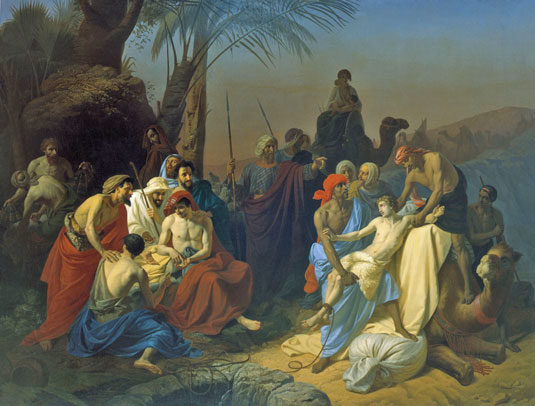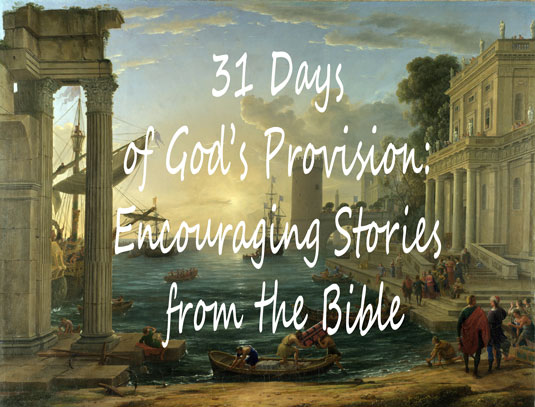 The story of Joseph begins in the Old Testament book of Genesis chapter 37. He lives with his father (also called Israel) in the land of Canaan, where his grandfather Isaac had also lived. Although Jacob has several sons, he makes no secret that Joseph is his favorite. He gives Joseph a special coat, which further annoys his jealous brothers. To make matters worse, Joseph has a dream and then can’t wait to tell them all about it.
The story of Joseph begins in the Old Testament book of Genesis chapter 37. He lives with his father (also called Israel) in the land of Canaan, where his grandfather Isaac had also lived. Although Jacob has several sons, he makes no secret that Joseph is his favorite. He gives Joseph a special coat, which further annoys his jealous brothers. To make matters worse, Joseph has a dream and then can’t wait to tell them all about it.
He said to them, “Listen to this dream I had: We were binding sheaves of grain out in the field when suddenly my sheaf rose and stood upright, while your sheaves gathered around mine and bowed down to it.” His brothers said to him, “Do you intend to reign over us? Will you actually rule us?” And they hated him all the more because of his dream and what he had said. Then he had another dream, and he told it to his brothers. “Listen,” he said, “I had another dream, and this time the sun and moon and eleven stars were bowing down to me.” Genesis 37:6-9, NIV
Joseph’s brothers have had enough of him. One day while grazing their father’s sheep, they see him approaching, and conspire together to do away with their little brother.
But they saw him in the distance, and before he reached them, they plotted to kill him. “Here comes that dreamer!” they said to each other. “Come now, let’s kill him and throw him into one of these cisterns and say that a ferocious animal devoured him. Then we’ll see what comes of his dreams.” Genesis 37:18-20, NIV
Joseph’s brother Reuben has a bit more sense than the rest, and persuades the others not to kill Joseph, but to leave him in the empty cistern unharmed (Scripture indicates that he planned to return and rescue him later). So they strip him of his fancy coat, throw Joseph into the cistern and all but Reuben sit down to have lunch. As they are eating, they spot a traveling caravan and the remaining brothers come up with a new plan for ridding themselves of Joseph.
Judah said to his brothers, “What will we gain if we kill our brother and cover up his blood? Come, let’s sell him to the Ishmaelites and not lay our hands on him; after all, he is our brother, our own flesh and blood.” His brothers agreed. So when the Midianite merchants came by, his brothers pulled Joseph up out of the cistern and sold him for twenty shekels of silver to the Ishmaelites, who took him to Egypt. Genesis 37:26-28, NIV
By now, Reuben has returned to pluck Joseph from the cistern, only to learn that the others have already sold him into slavery. The brothers conspire together to get their story straight before heading back home to break the sad news to their father Jacob.
Then they got Joseph’s robe, slaughtered a goat and dipped the robe in the blood. They took the ornate robe back to their father and said, “We found this. Examine it to see whether it is your son’s robe.” He recognized it and said, “It is my son’s robe! Some ferocious animal has devoured him. Joseph has surely been torn to pieces.” Then Jacob tore his clothes, put on sackcloth and mourned for his son many days. All his sons and daughters came to comfort him, but he refused to be comforted. “No,” he said, “I will continue to mourn until I join my son in the grave.” So his father wept for him. Genesis 37:31-35, NIV
In the meantime, Joseph is taken to Egypt and sold to Potiphar, one of Pharaoh’s officials and captain of the guard. Potiphar finds Joseph to have excellent organizational and managerial skills. Eventually, Joseph is promoted to oversee Potiphar’s household. Unfortunately this situation does not last, and Joseph is imprisoned after being falsely accused by Potiphar’s deceitful wife. God, however, continues to bless Joseph as his administrative skills are recognized and he is given favor by the warden. Eventually Joseph is summoned to interpret Pharaoh’s prophetic dream. He does so, describing seven years of famine that will follow seven years of abundance in Egypt. Joseph suggests that Pharaoh prepare for it by storing food during the first seven years of plentiful harvest. Pharaoh is so impressed by Joseph’s ability that he promotes him to head up the project.
Fast forward a few years. The famine occurs, but Egypt is ready for it, due to Joseph’s diligent storage program. When other countries hear that there is food available in Egypt, people flock there to buy it, including Joseph’s family.
Now Joseph was the governor of the land, the person who sold grain to all its people. So when Joseph’s brothers arrived, they bowed down to him with their faces to the ground. As soon as Joseph saw his brothers, he recognized them, but he pretended to be a stranger and spoke harshly to them. “Where do you come from?” he asked. “From the land of Canaan,” they replied, “to buy food.” Genesis 42:6-7, NIV
Joseph is in a position of authority, and holds the power to show vengeance or to show mercy. His family travels back and forth between Canaan and Egypt, until finally Joseph reveals his identity to his brothers. They are shocked, and afraid that he will avenge himself and have them killed for their past treachery. Instead Joseph extends forgiveness and reassures them.
Joseph said to his brothers, “I am Joseph! Is my father still living?” But his brothers were not able to answer him, because they were terrified at his presence. Then Joseph said to his brothers, “Come close to me.” When they had done so, he said, “I am your brother Joseph, the one you sold into Egypt! And now, do not be distressed and do not be angry with yourselves for selling me here, because it was to save lives that God sent me ahead of you. For two years now there has been famine in the land, and for the next five years there will be no plowing and reaping. But God sent me ahead of you to preserve for you a remnant on earth and to save your lives by a great deliverance. Genesis 45:3-7, NIV
Joseph recognizes that his ordeal put him in a position to save his entire family during the famine. He understood that God had taken a bad situation, and made it work together for good.
You intended to harm me, but God intended it for good to accomplish what is now being done, the saving of many lives. Genesis 50:20, NIV
Joseph brings his whole family into the land of Egypt where he can provide for them.
Now hurry back to my father and say to him, ‘This is what your son Joseph says: God has made me lord of all Egypt. Come down to me; don’t delay. You shall live in the region of Goshen and be near me—you, your children and grandchildren, your flocks and herds, and all you have. I will provide for you there, because five years of famine are still to come. Otherwise you and your household and all who belong to you will become destitute.’ Genesis 45:9-11, NIV
Because they lived, this family became the twelve tribes of Israel. God reunited brother with brother and father with son in a miraculous way that only God could have orchestrated.
Joseph’s story was one of estrangement, but God’s provision was one of reconciliation.
Join me tomorrow for a story involving the queen’s treasurer, the book of Isaiah, and a provision of discernment!
 If you’ve missed any part of this series, you can find all of the posts in the side bar category 31 Days of God’s Provision.
If you’ve missed any part of this series, you can find all of the posts in the side bar category 31 Days of God’s Provision.
On the journey toward Home,












{ 1 trackback }